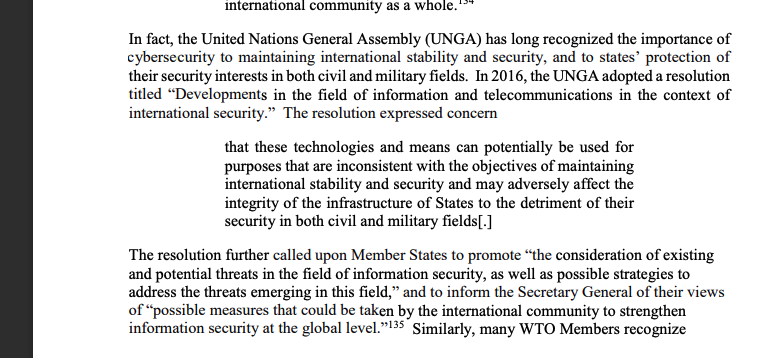In US-Certain Measures on Steel and Aluminum Products. -One thing that many of us found interesting was the DS512 panel's elucidation as to how a Member can articulate 'war or other emergency in international relations' XX(b)(iii).
@jbentonheath (who also wrote an excellent post over @WorldTradeLaw on this) observed the relevant paragraphs displayed ‘judicial managerialism’ – a flexible approach to security to account for novel types. Text of panel report: 7.134-7.135.
Its important to understand that within the DS512 Panel's framework, the meaning of 'essential security interests' (ESI) was left to the Member to articulate (7.131). But the Panel grounded this subjective determination in important ways.
First, the panel observed that what qualifies as a member’s sufficient level of articulation will depend on the 'emergency in international relations' at issue. That's from above. Second, the panel observed that ESI 'can be expected to vary with changing circumstances.' (7.131).
But this evolution led by the discretion of a Member to designate particular concerns as ESI is limited by its obligation to interpret and apply Article XXI(b)(iii) of the GATT 1994 in good faith. (7.131) The key reference here is to the AB in US-Shrimp.
In US-Shrimp, the AB outlined the principle of good faith. One application of this general principle outlined by the AB is the doctrine of abus de droit.
So this gets me back to the strategy for the US in its Steel/Aluminum tariffs cases. The US has observed the DS512 Panel’s connection between ESI and sub(b)(iii) and asserts that the subparagraph serves as a ‘temporal limitation’. (para 221 Feb 2020 Panel Q&A responses)
Adding further that subparagraph (iii) contains ‘no limitation on the type or nature of the ESI involved.’ (221). In other words, the types of ESI relevant for invoking XXI are not ‘limited’ by subparagraph (iii).
Here's where it gets interesting. Climate emergency remains a political subject. But cybersecurity? Well, its possible they've all read Ben's excellent work, and that's what they use to segregate ESI from the DS512 framework that tethers the subjective to the objective.
The US pointed to the fact that cybersecurity constitutes an ESI that does ‘not necessarily relate[] to subject matters in subparagraphs endings (i) and (ii)’, further arguing that a Member must have total discretion to determine the circumstances of subparagraph (iii) (para 229)
To elaborate on subject as ESI, US draws, inter alia, from the 2010 Report of the UN est'd Group of Governmental Experts and UNGA resolutions that elaborated on how technology and telecommunications could pose security threats in both civil and military fields. (para 222).
In addition, the US cited to its own and other Members’ domestic strategies, including that of China, Russia, Canada, New Zealand, Australia, Norway, India, and the Netherlands, which raised the issues of cyberspace and online information services. (para 223-228).
Key for the US is to argue that the text of Article
XXI(b) does not curtail the scope of action a Member may consider necessary in the circumstances of subparagraph (iii). But what its really about the US articulating its ESI as related to the emergency it must demonstrate.
XXI(b) does not curtail the scope of action a Member may consider necessary in the circumstances of subparagraph (iii). But what its really about the US articulating its ESI as related to the emergency it must demonstrate.
Other consequences? It means scholars like @neha_mishra_nm @JoshuaPMeltzer @t_streinz and others may see some really interesting opportunities for assessment of the concept of cybersecurity and the role for the multilateral trading rules. Q&A available: https://ustr.gov/sites/default/files/enforcement/DS/US.As.Pnl.Qs1.(DS548).fin.(public).pdf

 Read on Twitter
Read on Twitter




